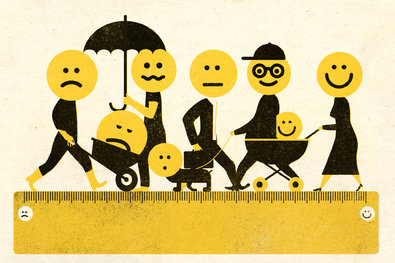
The Relentless Pursuit of Happiness
The influence of the field of “happiness economics” is growing. Many corporations now employ “chief happiness officers,” and mood-tracking personal devices are gaining in popularity. But some say quantifying happiness only leads to anxiety, as individuals can’t “achieve” what is an inherently elusive feeling. Plus, all the data collected on human emotions can be used for more targeted marketing, or manipulation. Is happiness a healthy goal for society?
* relentless = 끈질긴, 수그러들지 않는/ pursuit (of ~) = (~의) 추구, 추격/ mood = 기분; 분위기/ quantify = 수량화하다, 양을 나타내다/ inherently = 본질적으로; 선척적으로/ elusive = 찾기[규정하기/달성하기] 힘든/ manipulation = 조작, 속임수; 교묘한 처리
 행복은 사회의 정상적인(건전한) 목표인가요?
행복은 사회의 정상적인(건전한) 목표인가요?
1. Don’t Make Personal Growth a Utilitarian Goal
Happiness indicators are increasingly used as a basis to transform or discipline individuals.
2. An Important Indicator of Societal Progress
Quality-of-life assessments that account for happiness and life satisfaction go beyond what G.D.P. can show.
3. No Unbiased Way to Measure Happiness
Some economists propose replacing G.D.P. with a measure of national happiness. But it is too shaky a concept to bear so much weight.
4. Pursue Happiness, But in Moderation
Happiness, it turns out, doesn’t just feel good – it precedes, relates to and leads to success in life.
Sample Essay
Happiness Is an Important Indicator of Societal Progress
If happiness is defined by an individual’s freedom to choose, and lead, a life he or she has reason to value, it is worth tracking it as a sign of national progress.
There was a time when most economists believed that income was a fair measure of personal well-being, and G.D.P. per capita could adequately reflect a country’s progress.
Today, few would disagree that quality-of-life assessments should be multidimensional. The United Nations Development Programme, for example, ranks countries by an annual human development index that aggregates income, life expectancy and education. But are even these factors fully adequate for measuring social well-being?
In 2008, President Nicolas Sarkozy of France designated a commission led by Joseph Stiglitz and Amartya Sen, both Nobel laureates, to identify which indicators best measure the economic performance and social progress of nations “beyond G.D.P.” I was a member of that commission, and we identified many factors in addition to income and wealth that determine quality of life, including health, education, environmental conditions, social connections, political voice and security.
Yet these are still objective indicators. They tell us little about a person's own assessment of his or her well-being.
Subjective indicators, like happiness and life satisfaction, capture an important dimension of well-being that is missed by objective measures. Self-reporting also shows the importance people place on having dignity and a voice, as well as access to democratic institutions.
But there are limits to self-reporting when it comes to public policy. Poor women in India, for instance, are much more likely than men to say they are well, even when a doctor’s examination suggests otherwise. Perhaps they cannot afford to take time off work when they are ill, or they are socialized into discounting personal well-being. Reliance on subjective measures could also make governments complacent about social injustice, using the “she is poor but happy” defense.
Ultimately, we need both objective and subjective measures to accurately reflect quality of life on a global scale. And especially when it comes to framing policy, measurement and quantification, even when it comes to happiness, is important.
What's more, if enough people feel that their happiness depends on living in an environmentally sustainable and equal world, the pursuit of happiness could even be good for the planet.





![]() 행복은 사회의 정상적인(건전한) 목표인가요?
행복은 사회의 정상적인(건전한) 목표인가요?






